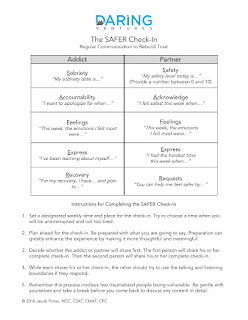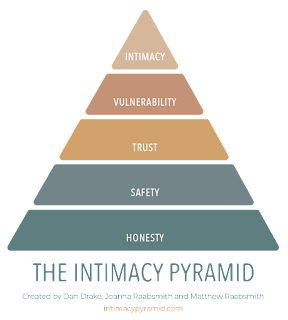Sorrow of the Damned: How Do I Know If My Husband is Really Sorry?
It’s time for a moment for brutal honesty from the home team here:
I have been SURE…
I have been SURE…
Absolutely
Positively
100%
Beyond a shadow of a doubt
Sure that my husband was…
in recovery,
really sorry, and
truly penitent
truly penitent
… 6 times... or more... in 17 years of marriage.
I promise you I am not easily manipulated. I’m an INFJ on the Myers-Briggs, one of those lucky few who have uncanny intuition. I have sniffed out my husband’s lies from the tilt of his head when he came home from work, woken up in the dead of night and “just known,” somehow felt the emotional distance before I ever found the evidence of betrayal.
And while he has attempted a fair amount of manipulation and gaslighting, I am convinced that every time my husband sat before me in tears and told me he was sorry, he meant it.
He believed it.
He was committed.
But, despite possibly a long stint of sobriety, despite some initial forays into getting help, and especially despite all of his tearful apologies, he could not fully enter a lifestyle of recovery.
- It wasn’t because he was a bad man.
- It wasn’t because he didn’t love me.
- It really wasn’t because he was trying to pull the wool over my eyes.
So, how do you know if your husband is really sorry and ready to live a lifestyle of recovery?
Consider these points from Recovered Peace:
- First it’s the, “white knuckle”, or “dry drunk.” “I can do this on my own” – which doesn’t work. They may be “sober” for a while, but that doesn’t mean recovery, which prevents relapse. They may be pushing against the addiction label and say, “I’m not that bad.” Some have what’s called, “terminal uniqueness” which means they think recovery works for other people, but they’re special and it doesn’t apply to them.
- Then it’s the “I can do this for you to make you happy”. They go to therapy and meetings for show but nothing is changing internally. Which doesn’t work because they aren’t doing it for themselves. They do it for you or to make it look like they’re doing recovery. Maybe they don’t have access to a real recovery resource like a CSAT, or take advantage of a full recovery program and just “check off the list” a few recovery items. They may even offer to have monitoring on their devices to “show” us they are in recovery and on good behavior. However they often just become better at hiding their addiction to objectifying and lust.
- Then after they relapse a few times because the approaches above just don’t work. We lay down the boundary of “real recovery or we’re done”, or they hit some other “rock bottom” and seriously see, “I can’t control my addiction any longer.” They finally embrace real recovery for themselves. And it shows in their behavior.
A bit counter-intuitive, right?
I know I have felt so very ashamed when I realized, once again, I had been duped, that my husband's recovery was not really a recovery after all. My shame often got the better of me, preventing me from reaching out for help and support. My natural and healthy desire to trust, forgive, and unconditionally love my spouse kept me in a cycle of abuse that I am still healing from today.
If you are accepting your husband's word about his repentance, having compassion on him for his tears and self-hate, know that you are acting in a normal way, the way we were meant to act in safe relationships. Unfortunately, safety is absent in relationship with an addict, and, after years of living with them, our intuition has been seriously damaged.
I encourage you to speak with a CSAT or betrayal trauma coach and seriously listen to their objective insights into your situation. If you are like me, you will think they are overreacting. I HATED hearing that my husband's behavior was in the "risky" category. In fact, it took me months in therapy to truly acknowledge how perilous and unusual (as far as non-addicts are concerned) his acting out had become. I had become so desensitized to the environment I was living in.
And I hear that same illusion, that same misconception of reality, repeated to me day in and day out from wives of sex addicts.
I offer my first consultation for free for this very reason. I am passionate about you getting the information and help you need regardless of whether or not you use my services. I want you to make decisions fully informed and fully aware of what you are facing. I urge you to take a chance on trusting others who have your best interest at heart and the objective experience to help reveal reality.
If you would like to learn more, feel free to peruse the reading list below or set up a consultation with me today.
Click Here to Schedule a 1-Hour Session with Coach Casey
BONUS: What does a Betrayed Spouse in recovery look like?
Helpful Blog Posts and Articles:
Disclaimer: I do not necessarily endorse the philosophies and/or advice of any of the authors. Please use at your own discretion.





Comments
Post a Comment